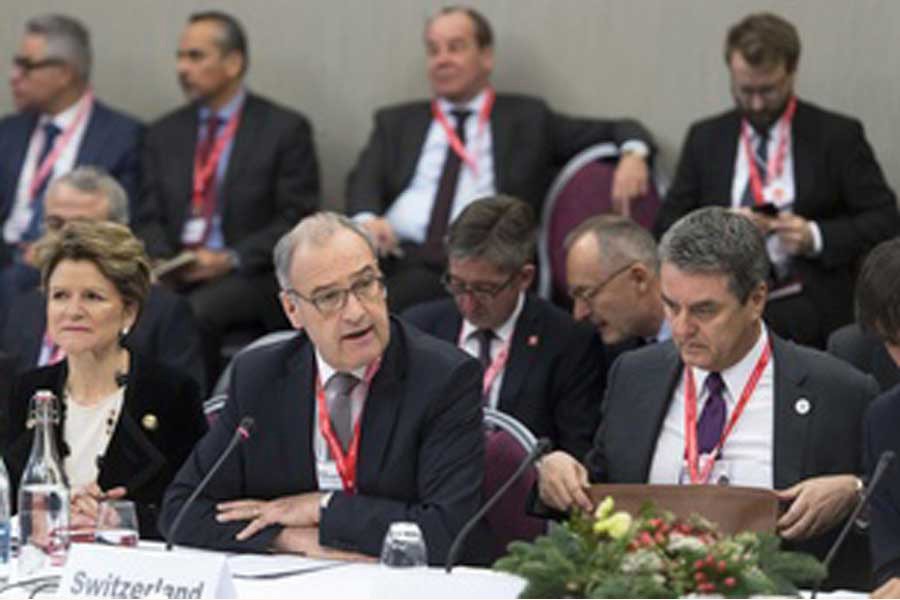Contrary to a popular belief, the World Trade Organisation (WTO) is not facing any existential crisis. This was proven by the deliberations at the World Economic Forum's 50th annual conference at Davos last week. Nearly 38 countries were present of which 18 agreed to pursue a multiparty appeals arrangement for settling trade dispute panel decisions until the WTO's Appellate Body is resuscitated. Equally importantly, other functions are equally important and they are alive and kicking including deliberations at its dispute settlement panels.
The WTO has three major functions and one of them is to ensure transparency in the system of governing the multilateral trading system as per its rules and regulations. This is done through various Committees of the WTO. Unfortunately, over the years the functioning of these Committees has weakened, primarily because of an over-emphasis on the two other functions of the WTO, which are negotiations and dispute settlement.
Thus, the multilateral trading system under the aegis of the WTO is facing a number of challenges and they have to be addressed. This is not just for its full blooded revival but more importantly for highlighting its virtues of facilitating sustainable economic development including job creation as enshrined in its Preamble.
Much of these challenges are emanating from the absence of interest (political will) on the part of a majority of its members as they are unable to understand the values -- shared security and prosperity -- that it can bring to their trade as against bilateral/regional trade agreements. Such values are to be analysed and understood in respect to their political economy dimensions, not just trade per se.
It was agreed at the conclusion of the Uruguay Round of the General Agreement on Tariffs and Trade (GATT) in 1994 that various WTO Committees will take forward their respective built-in agenda, which will pave the way for gradual liberalisation, which is the ethos of the WTO - not free trade per se but gradual freeing of trade as per the needs and capacity of countries.
As a result of the push for introducing four new issues at the first Ministerial Conference of the WTO held in Singapore in December, 1996, then the call for a Millennium Round of negotiations at the third Ministerial Conference in Seattle in October, 1999 and finally the launch of the Doha Round in November, 2001, the negotiating function of the WTO's Committees got hijacked by the so-called development interests, which are at times contrary to trade interests, resulting in bumps in negotiations as well.
The weakening of the WTO's Committees also had its effects on the functioning of its dispute settlement body (DSB). On many occasions, the WTO DSB panels and its Appellate Body's decisions went beyond their remit resulting in distorted interpretations of trade rules. Therefore, future reform of the WTO DSB should restrict the functioning of its Appellate Body in a time-bound manner and in respect to only those aspects of the relevant WTO agreements on which a dispute is raised.
Most importantly, the transparency function of the WTO should be strengthened by having some teeth -- not just tongue -- in its Committees. This will require a close review of the built-in agenda of various WTO agreements including the terms of references of the WTO Committees responsible for their implementation.
The current system of application of special and differential treatments (S&DTs) for developing and least developed countries (LDCs) for implementing various WTO agreements is not working. One of the future activities of the WTO's Committees should be the re-orientation of S&DTs for facilitating trade as per the Preamble of the Agreement establishing the WTO. This should include an agenda to discuss trade adjustment programmes vis-à-vis implementation outcomes of the WTO agreements.
Furthermore, there is the need for creating a better-informed political economy discourse in Geneva and in major capitals about the virtues of having a new kind of flexibilities in future trade agreements as per the needs and capacity of the WTO members. The WTO Agreement on Trade Facilitation is one such example as it has adopted a new kind of flexibilities for developing and least developed countries. They are required to implement various provisions and sub-provisions of this Agreement as per their needs and capacity, and, as a result, a useful instrument for regional integration, among other virtues.
In sum, while its existential crisis is not there, the WTO is experiencing a slippery slope and that must be arrested and pushed upward. The Davos meeting was able to take steps in this direction. Nevertheless, it is time for the international trade community to reflect on the virtues of the multilateral trading system and including specific actions for reforming its various functions so as to get them re-aligned with the WTO's Preamble.
Among others, specific actions should include:
- Creation of a critical mass of support for the European Union-Canada proposal for reforming the WTO's dispute settlement system
- Revival of the built-in agenda of the existing WTO agreements by advocating for greater transparency in the functioning of the WTO's Committees
- Absorption of the values of the WTO Agreement on Trade Facilitation for future multilateral negotiations
Pradeep S. Mehta and Bipul Chatterjee work for CUTS International, a global public policy think- and action-tank having its centres in Geneva and Washington DC, among other capitals


